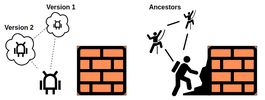The Cs said in 4D "thoughts are things", which suggests a more 'sensitive' information field set up, that responds to thoughts directly rather than waiting for the thinker to manually go and arrange the information into the form that was intended by the thought.
Thoughts are obviously as real as physical objects, even though in our silly materialist assumptions we often don't see it that way.
We can shape thoughts, exchange them, manipulate them, redirect them, smash them, lose them, find them, send them, throw them out, bring them in. We can have heated thoughts, cold thoughts, chaotic thoughts, beautiful thoughts. We can identify them, merge them, isolate them, dissolve them. We can like them, hate them, they can bar the way... They can be heavy, light, soaring, crashing... They can be pulled towards different "centers"/masses...
So obviously, in a sense they are "things", although there are differences. They are not subject to the same regularities as the physical world, but they have their regularities too: they depend on logical relations for example, and at least in our world, on their sequence.
But maybe from a higher perspective, thoughts aren't "in sequence" in the same way? I.e., mathematically, it's combination there rather than a permutation?
(Ark) Yes. It's a mathematical question. One thing is to talk about gravity, and another thing is to do something about gravity. Apparently, geometry is important somehow for understanding gravity. We know our space is 3 dimensional. Well, why? Well, probably there is some reason. And then we know there are other dimensions. How many, we don't know...
A: Necessary for expression of thought in sequence.
Q: (Ark) I don't see any reason for that. It could be 2 or 1 or 4.
(L) Apparently, in order for it to be in sequence, maybe thoughts are something more than 2-dimensional things?
A: Yes
Q: (Ark) Well...
A: Geometry of thought requires it.
It's interesting that the Cs used "Geometry of thought" here. It's like geometrical constraints for thoughts - like "along which lines" thoughts can run. The terrain underlying the "thought world" in which we navigate with our minds, which in our 3D world then are expressed in sequence.
If we make direct contact with the information field/"thought world", the difference is that we are not necessarily moving through it in sequence, but get sort of a "parallel" vision of an entire chunk of the terrain. Hence the geometrical nature of it: we momentarily perceive a bigger structure, which can "form" our thoughts directly because we kind of sense the whole picture, as opposed to wandering around within the maze just going off this clue or that.
Oh dear. My left hemisphere demands answers!!11!





